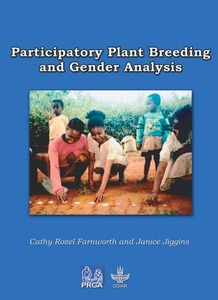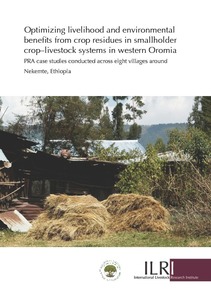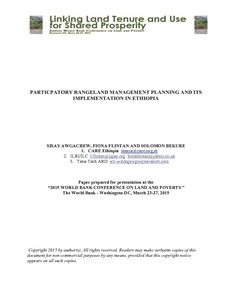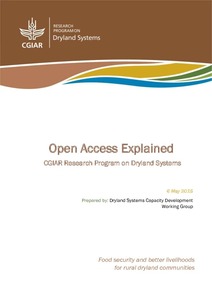parcours
AGROVOC URI:
Organizing for local-level watershed management : lessons from Rio Cabuyal watershed, Colombia
Watershed management involves the integrated management of a multitude of resources such as crop land, pastures, forests and water to each of which a multitude of often conflicting interests relate. These interests arise from stakeholders inside as well as outside the watershed. The identification and negotiation of these interests therefore is an important element in watershed management.
Optimizing livelihood and environmental benefits from crop residues in smallholder crop-livestock systems in western Oromia: PRA case studies conducted across eight villages around Nekemte, Ethiopia
Participatory analysis of vulnerability to drought in three agro-pastoral communities in the West African Sahel
Drought is one of the major climatic hazards impacting on the various sectors including crop and livestock in the West African Sahel. Pastoral and agro-pastoral communities in the region are regularly affected by drought, with vulnerability differing with gender, age, wealth status (access to cropland and livestock endowment), geographic location, social networks, and previous exposure to drought. Effective interventions require regular monitoring of vulnerability to drought, for which various quantitative and qualitative approaches exist.
Our land, our animals: Herding in Kenya's Kitengela rangelands
Nickson Parmisa, a resident of Kitengela just outside Nairobi in Kenya, talks about the challenges of livestock herding in the face of climate change.
Participatory rangeland management planning and its implementation in Ethiopia
The pastoral and agro-pastoral areas of Ethiopia cover around 65% of the country’s surface area. Rangeland resources are managed under collective common property arrangements, which are increasingly coming under pressure from both internal and external forces of change including alternative, but not necessarily ‘appropriate’, land uses.
Options for adapting to climate change in livestock-dominated farming systems in the greater horn of Africa
The greater horn of Africa is one of the least developed regions in Africa. Livestock are an important economic resource and an essential asset for poor farmers in this region. Climate variability, population growth, low economic development, limited market integration, and low fertilizer use, amongst others put serious pressure on livestock production. The sustainability of the livestock production in the rangelands and the integrated crop-livestock systems is further jeopardised by climate change.
Participatory characterization of the Short-eared Somali goat and its production environment around Dire Dawa, Ethiopia
Characterization of the Short-eared Somali goat population around Dire Dawa, Ethiopia, was undertaken in a community-based and participatory approach. Range of participatory tools, including Focal Group Discussions, participatory mappings and transect walks, were employed to study the local community's Indigenous knowledge and practices in animal breeding. The breeding objective was defined in a participatory manner through own-flock ranking experiments.
Outcome Mapping and innovation platforms in the imGoats project: Reflections from Mozambique
The imGoats project (imgoats.org) seeks to investigate how best goat value chains can be used to increase food security and reduce poverty among smallholders in India and Mozambique. Funded by the International Fund for Agricultural Research (IFAD), the project is led by researchers from the International Livestock Research Institute (ILRI) in collaboration with the BAIF Development Research Foundation in India and CARE International in Mozambique. On 2-6 July 2012, the imGoats project held a learning and reflection workshop in Udaipur, India.










